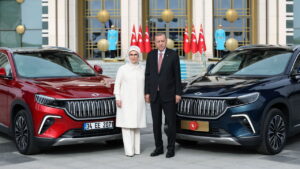
Turkish electric car manufacturer TOGG (Türkiye’nin Otomobili Girişim Grubu) has announced its entry into European markets and the introduction of new digital solutions, including the option to pay for cars with cryptocurrency, according to Autogeek.
According to the report, the company plans to open its first showrooms in Germany, the Netherlands, and Switzerland in 2025, as well as begin sales in other EU markets.
TOGG has already introduced the T10X electric crossover in Europe, which will be the brand’s first mass-produced export vehicle.
Buyers will have access to the innovative digital platform “Trumore,” through which they can place an order, select a configuration, and pay for their purchase — including using cryptocurrency or tokens issued within the TOGG ecosystem.
According to the company’s management, the integration of blockchain payments reflects its digitalization strategy and opens up new opportunities for users by combining electric mobility, fintech, and smart infrastructure.
“We are not just building a car, but a digital ecosystem where transportation, communications, and finance are combined into a single platform,” said TOGG CEO Gürcan Karakaş.
The company already produces electric vehicles at its plant in Gemlik (Bursa province). Production capacity is designed for 175,000 cars per year, with plans to increase this to 1 million units by 2035.
TOGG sees its entry into Europe as a strategic step towards promoting Turkish technology and integrating into the EU market.
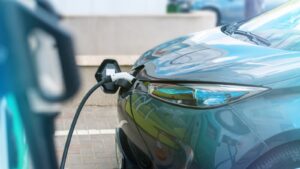
The total volume of the electric vehicle segment (imports of new and used vehicles and domestic resales) amounted to 9,700 in July 2025, which is 41.1% more than in July 2024 and 9.8% more than in June this year, according to the Automotive Market Research Institute.
“This is a historic record for our market, and there are three main drivers: rising fuel prices at gas stations, a general trend of growing interest in electric vehicles (which consists of improving their characteristics and reducing market prices), as well as the approaching customs clearance from VAT, which is scheduled for January 1, 2026,” the statement on the website says.
New electric cars accounted for 16% of this volume (1,552 units), while in July 2024 the share was 14.3%. At the same time, their sales increased by 58%.
“This is a new record for newly registered electric vehicles,” experts say.
Imports of used electric cars in July increased by 38% compared to July 2024, amounting to 5,154 units, and domestic resales increased by 38.8% to 3,010 units.
According to the Institute, compared to June this year, imports of new electric vehicles increased by 11.2%, used ones by 9.7%, and domestic resales by 9.4%.
Experts also analyzed the total fleet of electric transport in Ukraine (excluding industrial electric cars, trolleybuses, and rail vehicles): as of the end of July, it amounted to 178 thousand units, of which the largest number were passenger cars — 173.2 thousand, electric trucks — 3.7 thousand, several electric buses (8 units), and nearly 1,100 motorcycles.
“It is interesting that Tesla makes up the largest share of our electric vehicle fleet (19.9%), although Nissan had been the leader since the beginning of the ‘electrification’ process until recently, with a share of 19.4%. Volkswagen is third on the list with a share of 12.8%,” experts note.
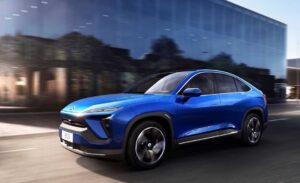
Extreme heat can reduce the range of an electric car by 31%, according to a report by Recurrent Auto, a company specializing in testing batteries for electric cars.
Recurrent experts have analyzed the battery readings of 7.5 thousand cars and found that at an air temperature of 27 degrees Celsius, the range is reduced relative to the maximum by almost 2.8%, at 32 degrees – by 5%, and at 38 degrees the drop can reach 31%.
At the same time, the data on the dynamics of charge consumption in conditions of 38-degree heat are extremely limited and need to be clarified, the company said, adding that if necessary, they will adjust the indicator on the basis of subsequent measurements.
The use of air conditioning, in turn, reduces the range only to a small extent. At the same time, reducing the temperature in the cabin by 7 degrees will require less energy than increasing it by 10 degrees.

JSC Kyiv Electric Car Repair Plant, part of the structure of Ukrzaliznytsia, in January-March 2022 received a net loss of UAH 10.96 million against a net profit of UAH 2.61 million for the same period in 2021.
According to the interim financial report of the enterprise, published in the information disclosure system of the National Securities and Stock Market Commission, its net income in the first quarter decreased by 40.7% – to UAH 77.37 million.
The plant received a gross loss of UAH 3.37 million (against a profit of UAH 6.74 million a year earlier), almost UAH 10 million of loss was received from operating activities.
According to the plant, in the first quarter of this year, it sold five repaired electrical sections for UAH 75.63 million (in January-March 2021 – nine sections for UAH 118.5 million), two wheel sets and three electric machines (a year earlier – one pair and 108 electric machines).
Kyiv Electric Car Repair Plant was founded in 1868 as a workshop for the repair of steam locomotives and wagons. It specializes in the overhaul of electric trains for the railways of Ukraine, the repair of components and assemblies, electric machines, electric motors and wheelsets, the manufacture of spare parts.
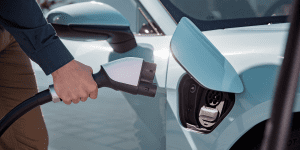
The Antimonopoly Committee of Ukraine (AMCU) has begun collecting information and studying the electric car charging market, the committee said on its website.
It notes the intensive growth of the electric car market in recent years, while the market for commercial charging stations is also growing. In this regard, the AMCU starts monitoring it in order to control compliance with the legislation on the protection of economic competition.
“The purpose of this control is to determine the state of the competitive environment in the market and its assessment; to identify and determine the problems in the market that hinder the development of competition; to ensure compliance with legislation on the protection of economic competition; to prepare, if necessary, based on the results of such control, proposals for the implementation of measures aimed to develop competition,” the committee notes.
The AMCU called on current and potential market participants to provide information and considerations on possible economic, organizational, administrative and technical barriers that may prevent new companies from competing in the electric vehicle charging market.
As reported, Minister of Infrastructure Vladyslav Krykliy said in November 2020 that Ukraine supports the use of ecological modes of transport in cities, therefore, as part of the National Transport Strategy until 2030, it plans to completely replace all urban public transport with electric one and create the appropriate infrastructure for this.
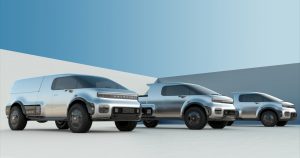
The initial registration of electric vehicles in Ukraine (new and used) in January-March 2020 increased by a third compared to the same period in 2019, to 1,700 units, Ukrautoprom reports. At the same time, in March, registrations of passenger cars fell by 16%, to 386 units, and commercial vehicles by almost 40%, to 23 units.
“Such a drop in registrations in the electric car market is due to the fact that its lion’s share is formed by used cars imported from abroad, the registration of which was suspended in the middle of last month due to quarantine,” the association’s press service explains.
At the same time, the share of imported used cars in March registrations of electric cars amounted to 86% (333 units), while in the commercial segment all 100% (23 units).
At the same time, Ukrautoprom draws attention to the fact that, despite all the restrictions due to quarantine measures, registrations of new passenger electric cars in March increased by 36% compared to March 2019, to 53 units.
The undisputed leader in the electric car market remains Nissan Leaf: last month 129 cars of this model (all used) passed Ukrainian registration.